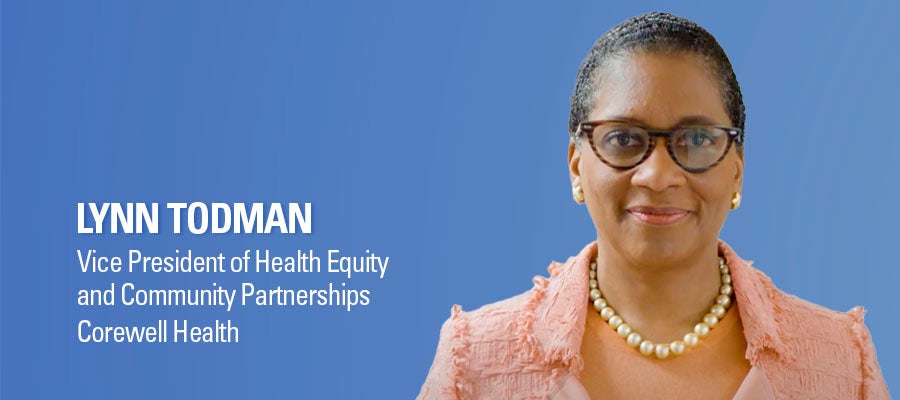Advancing Black Maternal Health Through Strategic Use of the AHA’s Health Equity Roadmap

Since 2018, Black Maternal Health Week has been a national observance from April 11–17. This annual observance was created by the Black Mamas Matter Alliance to raise awareness, advocate for change and support the unique experiences of Black mothers while advancing the principles and practices of reproductive and birth justice movements.
As we're observing Black Maternal Health Week this year, there is still an ongoing crisis affecting Black mothers in America's health care system. Despite advancements in medicine and improved access to care, Black women continue to experience significantly higher rates of maternal mortality and morbidity. This is not a recent problem; systemic inequalities, historical injustices and persistent disparities in health care are major contributors to the issue.
Lynn Todman, vice president of health equity and community partnerships at Corewell Health, discusses how Corewell utilizes the AHA’s Health Equity Roadmap to advance Black maternal health to ensure equitable outcomes.
Can you explain how Corewell Health has used innovation with the Health Equity Roadmap to specifically address unique challenges faced by Black mothers in maternal health care?
Our approach involves developing a Transformation Action Plan that comprises a portfolio of initiatives that include primary, secondary, tertiary and health promotion activities in clinical, institutional, community and broader societal settings. The idea is to make sure that the initiatives formed are aligned, synchronized and mutually supportive bodies of work that embody the levers of the Health Equity Roadmap.
Another innovation involves intentional planning for sustainability beyond financial sustainability. This means building capacity for evaluation and assessment, reskilling and upskilling staff, developing an advocacy agenda as well as rethinking how we fund this work in perpetuity. For instance, one of our most important innovations is the creation of a dedicated team for monitoring, assessment and evaluation. The health equity evaluation assessment and analytics team are made up of data analysts, community benefit specialists, epidemiologists and social workers whose responsibility is to monitor, assess and evaluate the system health equity strategy.
How did Corewell bridge clinical and community health functions to strengthen internal collaborations, and what were the outcomes of these efforts?
About a year ago, the women's health team and the health equity team decided to meet monthly to share their work. This sharing has increased cross-departmental collaboration and enabled us to identify and tap synergies. For instance, the meetings offered opportunities for the community health teams and the women health service line to more effectively meet the needs of pregnant patients by creating a more robust and comprehensive continuum of care that extends from inside clinical settings to critical resources located in community settings, such as community doulas and supports for fatherhood. One notable outcome of these collaborative meeting is that the women's health service line team now serves as a feeder for the community-based breastfeeding education program. The uptake has been so successful that the community health team has had to increase the number of available classes.
Can you provide examples of any innovative approaches or promising practices Corewell Health has implemented to improve Black maternal health outcomes?
One of our most promising practices is reflected in the Strong Beginnings program which is a large collaborative initiative comprising numerous stakeholders in health care and social services. The programs combine the traditional maternal infant health program with the additional support of community health workers, nurses and social workers. They utilize a community-based team approach to provide parents with health care, social and emotional support, and education during their pregnancies and the first 18 months of their infants’ lives. The data from the program indicates a noteworthy reduction in the risk of preterm births, more timely access to prenatal care, and decreased risk of low-birth-weight babies. The program results were published in JAMA Pediatrics last summer.
Looking ahead, how does Corewell plan to use the Health Equity Roadmap to promote health equity in Black maternal health care?
We will continue to ensure that the levers of the Health Equity Roadmap are reflected in and operationalized through our strategy and our Transformation Action Plan. We will continue to ensure that the care receive by Black pregnant patients is culturally appropriate. Staff members will work to collect and analyze data to help us better understand where maternal health and outcomes disparities exist. In addition, Corewell will continue its partnerships with community stakeholders – such as a community-based organization – that can facilitate access to critical services, like doulas, for pregnant people.
Crysta Meekins is the Senior Program Manager at the Institute for Diversity and Health Equity.
